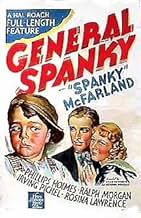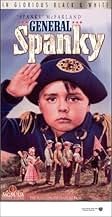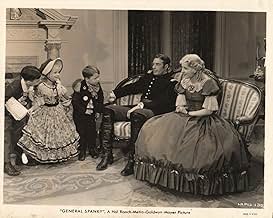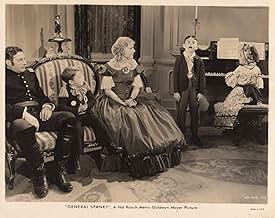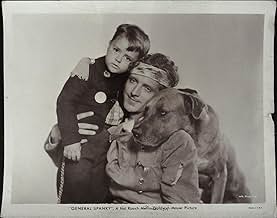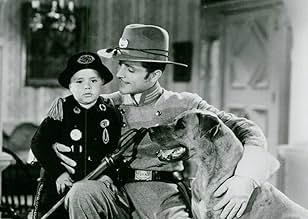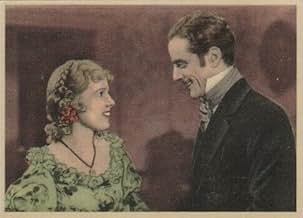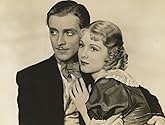A small boy is instrumental in a famous Civil War victory.A small boy is instrumental in a famous Civil War victory.A small boy is instrumental in a famous Civil War victory.
- Nominated for 1 Oscar
- 1 nomination total
George 'Spanky' McFarland
- Spanky
- (as Spanky McFarland)
Billie 'Buckwheat' Thomas
- Buckwheat
- (as Billie Thomas)
Carl 'Alfalfa' Switzer
- Alfalfa
- (as Carl Switzer)
James P. Burtis
- Boat Captain
- (as James Burtis)
Willie Best
- Henry
- (as William Best)
Ernie Alexander
- Boat Passenger
- (uncredited)
Hooper Atchley
- Slavemaster at Meeting
- (uncredited)
Harry Bernard
- Bit
- (uncredited)
John 'Uh huh' Collum
- Kid Army Member
- (uncredited)
Jack Cooper
- Bit
- (uncredited)
Al Corporal
- Man on Boat
- (uncredited)
Featured reviews
This is a cute film starring Spanky, Alfalfa and Buckwheat from the "Our Gang" comedies. Set in the South during the Civil War, it may seem a little odd to see Buckwheat as Spanky's slave, but this film is as charming as the best of the shorts with the same cast. This was the only Our Gang feature film, and I highly recommend it over The Little Rascals remake from 1994.
The Our Gang series of shorts took place in more urban settings, and there were few overtly racist moments in those shorts - all the kids were playing together, in the same spaces, going in and out of the same doors, in and out of each other's homes, and no reference made to segregation or Jim Crow, etc. There was stereotyping, for sure - the black American kids, the Italian kids, the Asian kids, the fat kids, etc. But the lack of those overt racist moments is probably why these shorts have translated well enough for modern viewing.
But this full-length feature throws all that out the window: here is a story set in the South and presenting enslaved black Americans as happy, sweet simpletons, treated wonderfully by their owners. It's not "Birth of a Nation" bad - more "Song of the South" bad. There's even a conversation 10 minutes into the movie between two slave owners, bragging at how well fed and cared for their slaves are. Buckwheat, here an enslaved child, overhears the violence these owners say they would do on a re-captured runaway slave, and as he is run-away, he is terrified. It's supposed to be a funny moment - but to any halfway caring human being, knowing what really did happen to re-captured run- away slaves, the incredible violence and humiliation that was all too real, it's painful now to watch this scene, to watch this reality made light of. It would be like watching an old movie making fun of the Holocaust. Lots of other cringe-worthy moments as well, like Spanky proudly proving he's a "Southern Gentleman" to Alfalfa by showing off "his" slave, smiling happy Buckwheat.
So, why did I give it a 7? Because it is a PERFECT example of how, 70 years after the Civil War - and beyond - the myths of the happy slave, the genteel white slave owner, the "noble" and brave fighters for the Southern "cause" and the boorish, cowardly Northerners was/is perpetuated in the USA, this time with the overwhelming cuteness and charm of Spanky and Buckwheat, probably the two most popular members of the Little Rascals (they were always my favorites).
But this full-length feature throws all that out the window: here is a story set in the South and presenting enslaved black Americans as happy, sweet simpletons, treated wonderfully by their owners. It's not "Birth of a Nation" bad - more "Song of the South" bad. There's even a conversation 10 minutes into the movie between two slave owners, bragging at how well fed and cared for their slaves are. Buckwheat, here an enslaved child, overhears the violence these owners say they would do on a re-captured runaway slave, and as he is run-away, he is terrified. It's supposed to be a funny moment - but to any halfway caring human being, knowing what really did happen to re-captured run- away slaves, the incredible violence and humiliation that was all too real, it's painful now to watch this scene, to watch this reality made light of. It would be like watching an old movie making fun of the Holocaust. Lots of other cringe-worthy moments as well, like Spanky proudly proving he's a "Southern Gentleman" to Alfalfa by showing off "his" slave, smiling happy Buckwheat.
So, why did I give it a 7? Because it is a PERFECT example of how, 70 years after the Civil War - and beyond - the myths of the happy slave, the genteel white slave owner, the "noble" and brave fighters for the Southern "cause" and the boorish, cowardly Northerners was/is perpetuated in the USA, this time with the overwhelming cuteness and charm of Spanky and Buckwheat, probably the two most popular members of the Little Rascals (they were always my favorites).
When I first saw this obscure film--the ONLY feature of the Our Gang kids--I was expecting a feature-length version of one of their shorts, so naturally I was quite unhappy with GENERAL SPANKY. Watching it again after many years, I find it more strange than unsatisfying. There are a lot of excellent elements in the film, yet other parts of the film are cringe-inducing or surreal. Producer Hal Roach managed to take Laurel and Hardy from the world of comedy shorts to the world of features with great success, so it's not surprising that he would want to take the Our Gang kids from shorts to features. My only question is...why a Civil War vehicle, with Buckwheat as a slave! The box of the MGM/UA video states the Roach was inspired by the success of Shirley Temple in THE LITTLE COLONEL to cast Spanky, Buckwheat, and Alfalfa in an "Old South" setting, but Our Gang's brand of comedy is much different from Shirley Temple's. Interestingly, Hal Roach returned to the "Old South" setting a few years later, when he teamed Oliver Hardy with Harry Langdon (Stan Laurel refusing to re-sign his contract with Roach) in ZENOBIA, another strange film. Perhaps Roach was inspired to cash in on the GONE WITH THE WIND phenomenon with ZENOBIA? Since Mr. Roach was from New York State, it's interesting that he would buy into the "romantic Old South" mythology. In any event, as I said above, there are some excellent elements in this film. Buckwheat Thomas and Spanky McFarland are fantastic, charismatic performers who can easily carry a feature film on their own. Buckwheat, in particular, is quite moving, when he is looking at a birthday cake while incredibly hungry, and since he's never seen a birthday cake before, he thinks the cake is on fire, and because he is hungry, he starts to cry. The underrated Phillips Holmes (best known for the 1931 adaptation of Theodore Dreiser's AN American TRAGEDY), who reminds me somewhat of Onslow Stevens, is quite impressive as Marsh Valient, the Southern Gentlemen who takes in Spanky and Buckwheat. Holmes' scene with Spanky where the two of them discuss the nature of war was quite moving and still has a necessary message today (it reminds me of Oliver Hardy's speech on racial equality in ZENOBIA). Ralph Morgan turns on his gruff charm as the Union general who refers to Spanky as "General" and treats him as a peer throughout the film--the effect is somewhat surreal. Irving Pichel is superb as the arrogant and sleazy Union officer Simmons. On the whole, however, GENERAL SPANKY is such a strange experience, I don't really know what to make of it. Any serious Our Gang fan should see it, and people attracted to weird cinematic misfires might find it interesting also. It's still available cheaply from its early 90's VHS release. I've never been much of a fan of Alfalfa, and fortunately he doesn't appear in the film until half way through, and soon after he does his patented "off key singing" routine. It has not gotten any better with age. Fortunately, the film belongs to Spanky and Buckwheat, and they do a great job.
Spanky and his friends all decide to play army as the country is embroiled in war. His friends designate him their general and he leads them on a rather funny encounter with real Union troops! In addition, they help a nice Southern officer escape a hanging--a hanging orchestrated by a total jerk.
It's not hard to believe that Hal Roach Studios decided to give little Spanky from the Our Gang comedies his own feature film. After all, for his age, he was a dandy actor...and cute as a button. However, in hindsight, their choice of material was a bit on the grotesque side. It's not that setting the story in the South during the Civil War was necessarily a bad thing, but the whole slavery issue is very weird when you see it today. After all, in this film you see lots of black slaves standing about and singing for joy, as they apparently love their lot in life!! And, when Buckwheat (who is a runaway slave) begins to cry because he wants to have a master, too, it's just too much! If it weren't so evil, it would be comical. It's sad. Because without the racial insensitivity, the film is very good. The kids in the film are all good actors and Buckwheat really is quite adorable and effective in the film.
Rather surreal...that's for sure.
It's not hard to believe that Hal Roach Studios decided to give little Spanky from the Our Gang comedies his own feature film. After all, for his age, he was a dandy actor...and cute as a button. However, in hindsight, their choice of material was a bit on the grotesque side. It's not that setting the story in the South during the Civil War was necessarily a bad thing, but the whole slavery issue is very weird when you see it today. After all, in this film you see lots of black slaves standing about and singing for joy, as they apparently love their lot in life!! And, when Buckwheat (who is a runaway slave) begins to cry because he wants to have a master, too, it's just too much! If it weren't so evil, it would be comical. It's sad. Because without the racial insensitivity, the film is very good. The kids in the film are all good actors and Buckwheat really is quite adorable and effective in the film.
Rather surreal...that's for sure.
General Spanky (1936)
** (out of 4)
By 1936 Hal Roach was attempting to shut down his short productions and making Our Gang, Charley Chase and Patsy Kelly (among others) join the feature ranks. This film attempted to put the kids on the map of features but it's also clear that it was a pet project for the top-billed George "Spanky" McFarland. In the film, a Southern gentleman (Phillips Holmes) takes in Spanky and his "slave" friend Buckwheat. Soon the children are in the fields playing war as the Civil War is breaking out and the kids end up getting mixed up with real Yankee soldiers. GENERAL SPANKY is a rather controversial movie today because of its subject matter and the way it shows slavery to be something blacks needed and wanted. I'm really not sure what the mindset was in 1936 but it's clear Hollywood really hadn't changed their ways and wouldn't for nearly another two decades so that's important to remember when watching this thing. As far as the controversy, I would never blame anyone for being offended at the idea that blacks enjoyed being slaves and we're constantly going around with smiles on their faces. What's even more disturbing in this film is some early stuff where Buckwheat loses his master and cries about it before walking around a boat hoping someone will become his new master. There are countless stereotype jokes aimed at blacks but I think the idea of a black child needing a master is probably what's not going to sit well with many. What didn't sit well with me was the poor screenplay, which really doesn't try to do anything and I do find it easy to see why Roach and his features didn't work well for anyone. I think the biggest problem is the screenplay never seems to be too worried about being funny. I thought it did a good job at showing the South just before the Civil War but the majority of the jokes just fall flat. Check out the long-winded scene where Spanky is being fed fried chicken while Buckwheat is under the table and wanting a few pieces. Spanky sends them down but the dog gets them instead of Buckwheat. This entire sequence has zero laughs because the scene is told so poorly and the timing is off so bad. Another scene that doesn't work is when the kids are playing war not knowing that the real soldiers are coming down on them. The stuff with the gunpowder I'm sure was meant to be funny but it wasn't. It's a shame the screenplay is such a mess because the performances are actually pretty good. McFarland is as cute as ever and fits his role just fine as does Billie "Buckwheat" Thomas and Carl "Alfalfa" Switzer. GENERAL SPANKY, rightfully or wrongly, will probably always be looked down upon for its subject matter but even if you can get past that you're left with a pretty bland comedy that feels overlong even at just 71-minutes.
** (out of 4)
By 1936 Hal Roach was attempting to shut down his short productions and making Our Gang, Charley Chase and Patsy Kelly (among others) join the feature ranks. This film attempted to put the kids on the map of features but it's also clear that it was a pet project for the top-billed George "Spanky" McFarland. In the film, a Southern gentleman (Phillips Holmes) takes in Spanky and his "slave" friend Buckwheat. Soon the children are in the fields playing war as the Civil War is breaking out and the kids end up getting mixed up with real Yankee soldiers. GENERAL SPANKY is a rather controversial movie today because of its subject matter and the way it shows slavery to be something blacks needed and wanted. I'm really not sure what the mindset was in 1936 but it's clear Hollywood really hadn't changed their ways and wouldn't for nearly another two decades so that's important to remember when watching this thing. As far as the controversy, I would never blame anyone for being offended at the idea that blacks enjoyed being slaves and we're constantly going around with smiles on their faces. What's even more disturbing in this film is some early stuff where Buckwheat loses his master and cries about it before walking around a boat hoping someone will become his new master. There are countless stereotype jokes aimed at blacks but I think the idea of a black child needing a master is probably what's not going to sit well with many. What didn't sit well with me was the poor screenplay, which really doesn't try to do anything and I do find it easy to see why Roach and his features didn't work well for anyone. I think the biggest problem is the screenplay never seems to be too worried about being funny. I thought it did a good job at showing the South just before the Civil War but the majority of the jokes just fall flat. Check out the long-winded scene where Spanky is being fed fried chicken while Buckwheat is under the table and wanting a few pieces. Spanky sends them down but the dog gets them instead of Buckwheat. This entire sequence has zero laughs because the scene is told so poorly and the timing is off so bad. Another scene that doesn't work is when the kids are playing war not knowing that the real soldiers are coming down on them. The stuff with the gunpowder I'm sure was meant to be funny but it wasn't. It's a shame the screenplay is such a mess because the performances are actually pretty good. McFarland is as cute as ever and fits his role just fine as does Billie "Buckwheat" Thomas and Carl "Alfalfa" Switzer. GENERAL SPANKY, rightfully or wrongly, will probably always be looked down upon for its subject matter but even if you can get past that you're left with a pretty bland comedy that feels overlong even at just 71-minutes.
Did you know
- TriviaThe initials of R. P. W. C. R. C. W. M. R. (Spanky's Confederate Army) stands for "The Royal Protection of Women and Children, Regiment Club of the World and Mississippi River".
- Quotes
Spanky Leonard: I'm not no Yankee! I'm a Southern gentleman!
Alfalfa: How ya gonna prove it?
Spanky Leonard: Well, I've gotta slave!
Alfalfa: Oh, you have not.
Spanky Leonard: Tell him who you are?
Buckwheat: I his slave.
- ConnectionsEdited from La révolte des esclaves (1930)
- SoundtracksEzekiel's Wheel
(uncredited)
Traditional
Details
- Runtime1 hour 11 minutes
- Color
- Aspect ratio
- 1.37 : 1
Contribute to this page
Suggest an edit or add missing content


